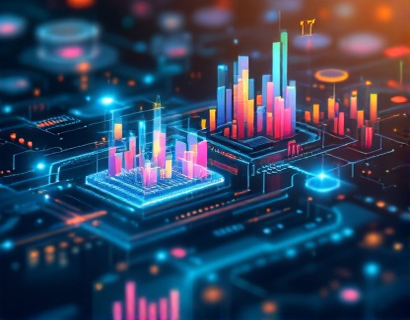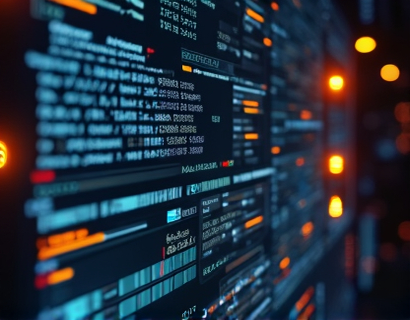Revolutionizing Digital Finance: The Synergy of AI and Crypto
The intersection of artificial intelligence and cryptocurrency is ushering in a new era of digital finance, one that promises unparalleled efficiency, security, and innovation. This article delves into the transformative impact of merging these two cutting-edge technologies, exploring how they are reshaping financial services and opening up new avenues for the future. For tech enthusiasts and innovators, this is a critical look at the intelligent solutions that are redefining digital interactions and financial management.
The Rise of Intelligent Cryptocurrencies
Cryptocurrencies, once seen as mere digital currencies, are evolving into sophisticated assets powered by AI. These intelligent cryptocurrencies leverage machine learning algorithms to enhance functionality, security, and user experience. One of the primary advantages is the ability to predict market trends with greater accuracy. By analyzing vast amounts of data, AI can identify patterns and make predictions that traditional methods might miss. This predictive capability allows investors to make more informed decisions, potentially leading to higher returns and reduced risks.
Moreover, AI-driven cryptocurrencies can automate transactions and smart contracts, reducing the need for intermediaries and lowering transaction costs. For instance, AI can optimize the execution of trades by continuously monitoring market conditions and adjusting strategies in real-time. This level of automation not only increases efficiency but also minimizes human error, ensuring a smoother and more reliable trading experience.
Enhanced Security Through AI
Security has always been a paramount concern in the crypto space, and AI is playing a crucial role in addressing these challenges. Traditional security measures, such as firewalls and encryption, are being augmented by AI-powered systems that can detect and respond to threats in real-time. Machine learning algorithms can analyze transaction patterns to identify anomalies and potential fraud, providing a proactive defense mechanism.
One significant application is in the realm of identity verification and anti-money laundering (AML) compliance. AI can process and analyze large datasets to verify user identities and detect suspicious activities with high precision. This not only enhances the security of crypto platforms but also helps in maintaining regulatory compliance, which is essential for the long-term sustainability of the industry.
Personalized Financial Services
The integration of AI in digital finance extends beyond cryptocurrencies to offer personalized financial services. AI algorithms can analyze user data to provide tailored investment advice, budgeting suggestions, and financial planning tools. This level of personalization is particularly beneficial for individuals who may not have access to professional financial advisors.
For example, AI-driven robo-advisors can create and manage customized investment portfolios based on an individual's risk tolerance, financial goals, and market conditions. These platforms continuously learn from user interactions and market data, refining their recommendations over time. This not only democratizes access to sophisticated financial tools but also empowers users to take control of their financial futures.
Decentralized Finance (DeFi) and AI
Decentralized Finance, or DeFi, is another area where AI is making significant strides. DeFi platforms aim to create financial systems that are transparent, accessible, and decentralized, leveraging blockchain technology. AI enhances these platforms by optimizing various aspects of DeFi, such as lending, borrowing, and yield farming.
AI can improve risk assessment and credit scoring in decentralized lending platforms, enabling more accurate and fair lending decisions. By analyzing user data and historical transaction patterns, AI can predict the likelihood of loan defaults, allowing for better risk management. Additionally, AI can optimize yield farming strategies by identifying the most profitable opportunities and automating the process of reallocating assets for maximum returns.
Smart Contracts and AI
Smart contracts, self-executing contracts with the terms directly written into code, are a cornerstone of blockchain technology. When combined with AI, smart contracts become even more powerful and versatile. AI can enhance the functionality of smart contracts by adding dynamic decision-making capabilities.
For instance, AI can be integrated into smart contracts to automatically adjust terms based on real-time market conditions or user behavior. This adaptability ensures that contracts remain fair and effective, even as circumstances change. Moreover, AI can help in the creation of more complex and sophisticated smart contracts, enabling a wider range of applications in areas such as supply chain management, insurance, and real estate.
Challenges and Considerations
While the potential of AI in digital finance is vast, there are several challenges and considerations that must be addressed. One of the primary concerns is the regulatory landscape. As AI and crypto technologies evolve, regulators are grappling with how to oversee these innovations without stifling growth. Ensuring compliance with existing regulations while fostering innovation is a delicate balance that requires collaboration between industry players and regulatory bodies.
Another challenge is the issue of data privacy. AI systems rely on large datasets, which raises concerns about user data protection. It is crucial for developers and platforms to implement robust data security measures and adhere to privacy regulations to build trust with users. Transparency in how data is collected, used, and protected is essential to maintain user confidence.
The Future of Digital Finance
Looking ahead, the synergy between AI and crypto is poised to revolutionize digital finance in numerous ways. As technology continues to advance, we can expect even more sophisticated intelligent solutions that enhance the efficiency, security, and accessibility of financial services. The integration of AI with blockchain and other emerging technologies will likely lead to the development of new financial instruments and platforms that were previously unimaginable.
For tech enthusiasts and innovators, the future is bright. The ongoing evolution of AI and crypto offers endless opportunities for innovation and growth. By staying at the forefront of these developments, individuals and organizations can position themselves to capitalize on the transformative potential of intelligent digital finance.
In conclusion, the combination of AI and cryptocurrency is not just a trend but a fundamental shift in how we approach financial services. As these technologies continue to mature, they will play an increasingly vital role in shaping the digital economy, offering smarter, more secure, and more personalized financial solutions for the future.










































